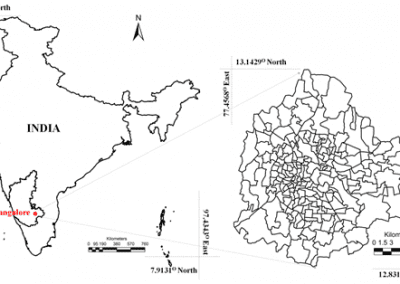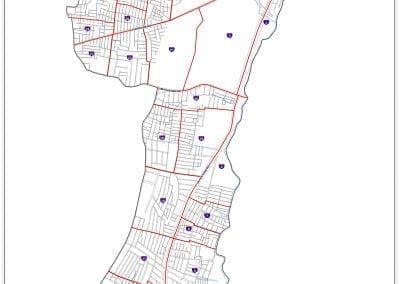Waste segregation, awareness campaign & waste management
for Block:6 of Kottigepalya ward:73, Bengaluru, INDIA IASH-CIM ProjectProject Goal:
- To sensitise and engage citizens in managing their waste in an environmentally and socially responsible manner by practicing source segregation. 3 way segregation (Biodegradable, Dry recyclables and Household Hazardous) as mandated by the Solid Waste Management Rules, 2016 would be implemented.
- To train the waste collectors to collect and process source segregated waste with the objective of achieving 90% resource recovery. Dry Waste to be further sorted and Biodegradable to be composted.
- To process bio degradable waste(500 kg per day) in a decentralised manner by establishing a composting unit. Thus creating resources out of waste and generating safe and clean livelihood opportunities for waste workers.
- The project would ensure 90% resource recovery which would translate into about 300 tons of waste being prevented from burning and unscientific dumping annually. Project would be implemented as a pilot for a block of 800-1000 households of a Bangalore city ward.
The following Sustainable Development Goals will be addressed:
- Good health & well being: By Managing waste in an environment friendly manner, improved health and overall wellbeing for the communities.
- Sustainable cities and communities: managing waste in a decentralised manner and recovering resources, supporting circular economy and generating dignified livelihood.
- Climate Action: Open dumping of mixed waste results in emission of methane gas additionally by supporting circular economy, there is significant drop in carbon foot print as virgin resources are not extracted and processed.
Background:
Bangalore city which was known as City of Gardens has now earned the tag of ‘Garbage city’ due to mismanagement of waste resulting in waste being piled up across the city. Dumpsites are full. Centralised waste processing units have not been able to manage the quantum of mixed waste being fed to these facilities. Source Segregation and Decentralised Processing can address the problem effectively. IASH, along with Leibniz University Hannover alumni Naveen and Vishwas, and Saahas have come up with this pilot project proposal to implement source segregation and Decentralised Waste Management facility for a block of 800-1000 household.
Activities:
- Awareness drive on waste segregation & its benefits.
- Distribute bags to for collecting dry waste.
- Train the local waste collector for efficient collection and handling of source segregated waste.
- Setup wet waste composting unit of 0.5 tons/day.
- Dry waste to be sorted in different categories and sent for recycling; non-recyclables to be sent for co-processing in cement factories.
Knowledge Transfer:
- Awareness drive on waste segregation & its benefits.
- Distribute bags to for collecting dry waste.
- Train the local waste collector for efficient collection and handling of source segregated waste.
- Setup wet waste composting unit of 0.5 tons/day.
- Dry waste to be sorted in different categories and sent for recycling; non-recyclables to be sent for co-processing in cement factories.
- The knowledge gained would help in managing waste efficiently with public participation.
- It would prevent waste black spots and create a cleaner and healthier environment.
- With periodic awareness drives and follow-up campaigns, the waste management system can sustain over a period of time
- Knowledge on decentralised waste management system
- Process for small size, low cost composting facilities.
- PhD and Master students in Environment, to support in creating awareness materials
- Diaspora experts to plan and help in execution
Awareness:
- Materials used for information collection, awareness drive and follow up visits, will be available online
- The wet waste composting unit would be accessible for the general public
- Data on wet waste collected, compost generated, etc would be made available
- Project learning, challenges and approaches evolved would be shared with the public and other government and non-government agencies.
Raising funds:
- CIM-GIZ funds 90% of the project
- IASH supporting remaining 10%
Time Duartion:
July 2018 – July 2019



